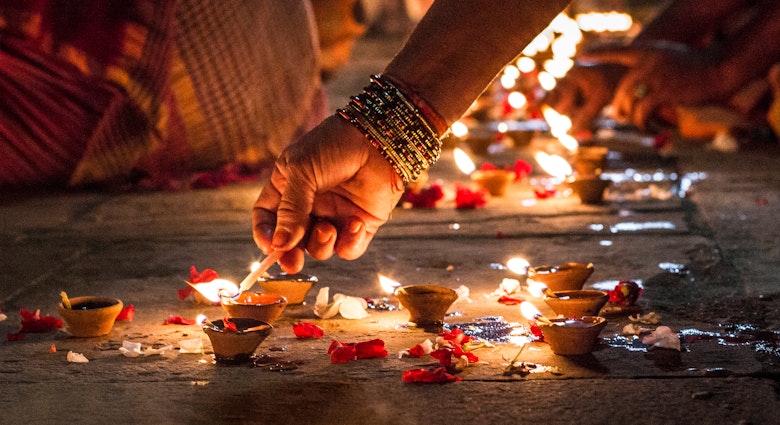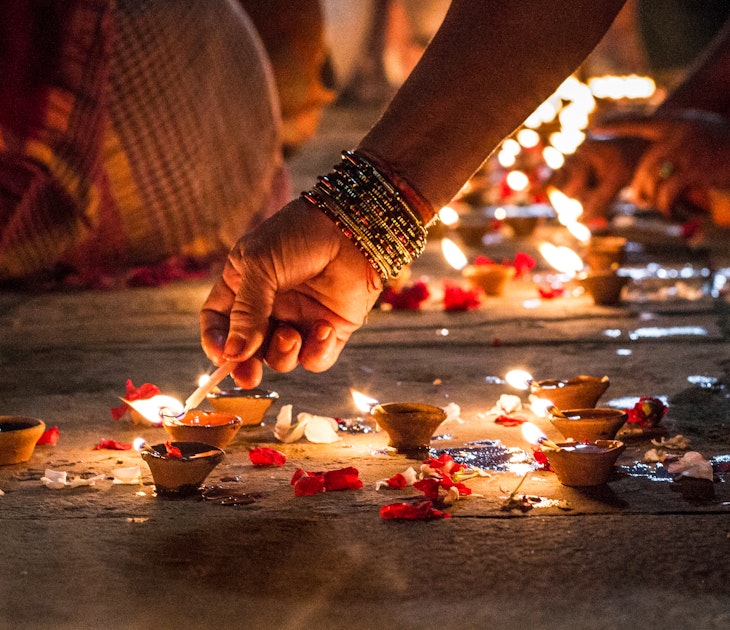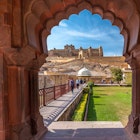

The streets of Delhi burst with vibrant colors including in the Lodhi street art district.
Things are changing fast in Delhi – the modern metropolis is now the capital of the world’s most populous nation, with a modern metro and an increasingly international feel. But Delhi has always treasured its incredible past.
As one of the world’s oldest continually occupied cities, you don’t have to look far to encounter Delhi’s fascinating history. But there are also lots of under-the-radar experiences waiting for you in this diverse and captivating city.
Get your Delhi explorations started with this list.
Explore the Red Fort
One of India’s most storied leaders, Mughal Emperor Shah Jahan, moved his capital to Delhi from Agra in 1648, in the same year that work was completed on his wife’s mausoleum, the Taj Mahal. He named his city Shajahanabad and built the magnificent Red Fort and the nearby Jama Masjid. The Red Fort was a key battleground against the British in the 1857 First War of Independence (you can still see the bullet holes). After the war, the British destroyed two-thirds of the buildings in the Red Fort and erected Victorian-style barracks on the grounds. Today, these have been repurposed as modern museums.
Detour: Just outside the Red Fort is Chandni Chowk, a prime hunting ground for Delhi street eats, aka Dilli-ka-chaat. Try Delhi specialties like dahi bhalle (fried lentil balls served with yoghurt and garnished with chutney) and chhole bhature (a breakfast favourite of spicy chickpeas, accompanied by puffy, fried bread with a light paneer filling). And don’t miss the photogenic spice market nearby.

Take a street-art tour in Lodhi Colony
Lodhi Colony was once a bland and blocky suburb of British-era housing estates, but the tall walls are now splashed with colour. Murals from over 50 Indian and international artists from Mexico to France, Canada to Singapore and everywhere in between, have graced the buildings with fabulous artworks. A project of the St+art India Foundation, many works take inspiration from Indian culture and heritage.
Planning tip: Refuel at the fabulous Carnatic Café specializing in Karnataka cuisine.
Crawl into the mouth of a demon at Jhandewalan Hanuman Temple
Not far from backpacker central in Paharganj, Jhandewalan Hanuman Temple towers above the landscape in Karol Bagh with its 112ft-high Hanuman statue. Enter the temple through a demon’s mouth and find an artificial cave full of life-sized sculptures of deities, some drinking the blood of Kali as it spurts from her beheaded neck.

Shop the best of India – all in one street
There are benefits to being the capital – whether it's food, culture, or arts and crafts, the best of India converges in Delhi. You can pick up souvenirs from across the country all in one place along Baba Kharak Singh Marg, extending from central Connaught Place.
There is half a kilometre of treasure-filled state emporiums here representing artisans from across India’s states. A couple of blocks east, the government-run Central Cottage Industries Emporium is a multi-storey treasure trove of handicrafts from across India, all at fixed prices.
Detour: While in the area, stop by the eccentric pink-and-white Jantar Mantar, built in 1725 by Maharaja Jai Singh II. There’s a massive sundial resembling a stairway to heaven and a world-time clock shaped like an inverted heart.

Consult an astrologer
Indian Vedic astrology, also known as Jyotish, has been practised in India for about 3000 years. While there are plenty of skeptics, astrologers are deeply embedded in Indian culture. South Delhi is a great place to consult an astrologer.
The best way to choose an astrologer is to check their online reviews and training. Generally the better the reputation, the more you’ll pay. Prices start at ₹1000 but ₹3000–6000 is typical for an hour with an English-speaking astrologer.
Explore Humayun’s Tomb
Sublimely proportioned and UNESCO-listed, the tomb of Emperor Humayun was constructed in 1570 to blend traditional Mughal architecture with the architectural traditions of Humayun’s Persian-born wife. The combination was so successful it was used as a model for the Taj Mahal.
Detour: Walking distance from Humayun’s Tomb are two standout Delhi attractions. Hazrat Nizamuddin Dargh is Delhi’s most mystical experience, as hundreds of devotees visit daily to pay respects to the Sufi saint. Nearby find more historic buildings in Sunder Nursery, a lovingly restored landscaped heritage park.

Visit the OTT temple of Akshardham
Visiting this modern temple on the eastern side of the river is a theme-park-like experience. Built in 2005, its "exhibitions" include a boat ride through 10,000 years of Indian history, a walk-through animatronic experience and a sound-and-light show. The real wonder, however, is the incredible temple itself, with pale-red sandstone carved into elaborate reliefs using traditional artisan skills, including 20,000 deities, saints and mythical creatures.
Meander Delhi’s bohemian village of HKV
Indie India converges on South Delhi’s Haus Khas Village, an arty little enclave of cool cafes, live-music venues, tattoo parlours and offbeat fashion right beside the Hauz Khas ruins. Crate dive for records, catch some live music, or play some yourself at Gypsy Cafe, a shoes-off, cushions-on-the-floor spot where musos gather to jam.

Visit the first mosque built on Indian soil at the Qutb Minar
The UNESCO-listed Qutb Minar was the first thing Qutb-ud-din Aibak built when he stormed into town in 1193, overthrowing the Tomar Rajputs. Built from the stones of the old fort and its temples, the minaret emphatically announced a new regime was in town. Muslims would rule Delhi from this time until the coming of the British. The complex includes the Quwwat-ul-Islam Masjid, India’s first mosque.
Detour: Close by, visit Mehrauli Archaeological Park, where 440 monuments dating from the 10th century are dotted through the overgrown forest.
Find serenity in a blossoming lotus
A stunning piece of architecture, the Bahai House of Worship is shaped like a lotus flower, with 27 delicate-looking white-marble petals. The temple was created to bring faiths together; visitors are invited to pray or meditate silently according to their own beliefs and there’s an almost tangible feeling of serenity inside the space.

Explore related stories










